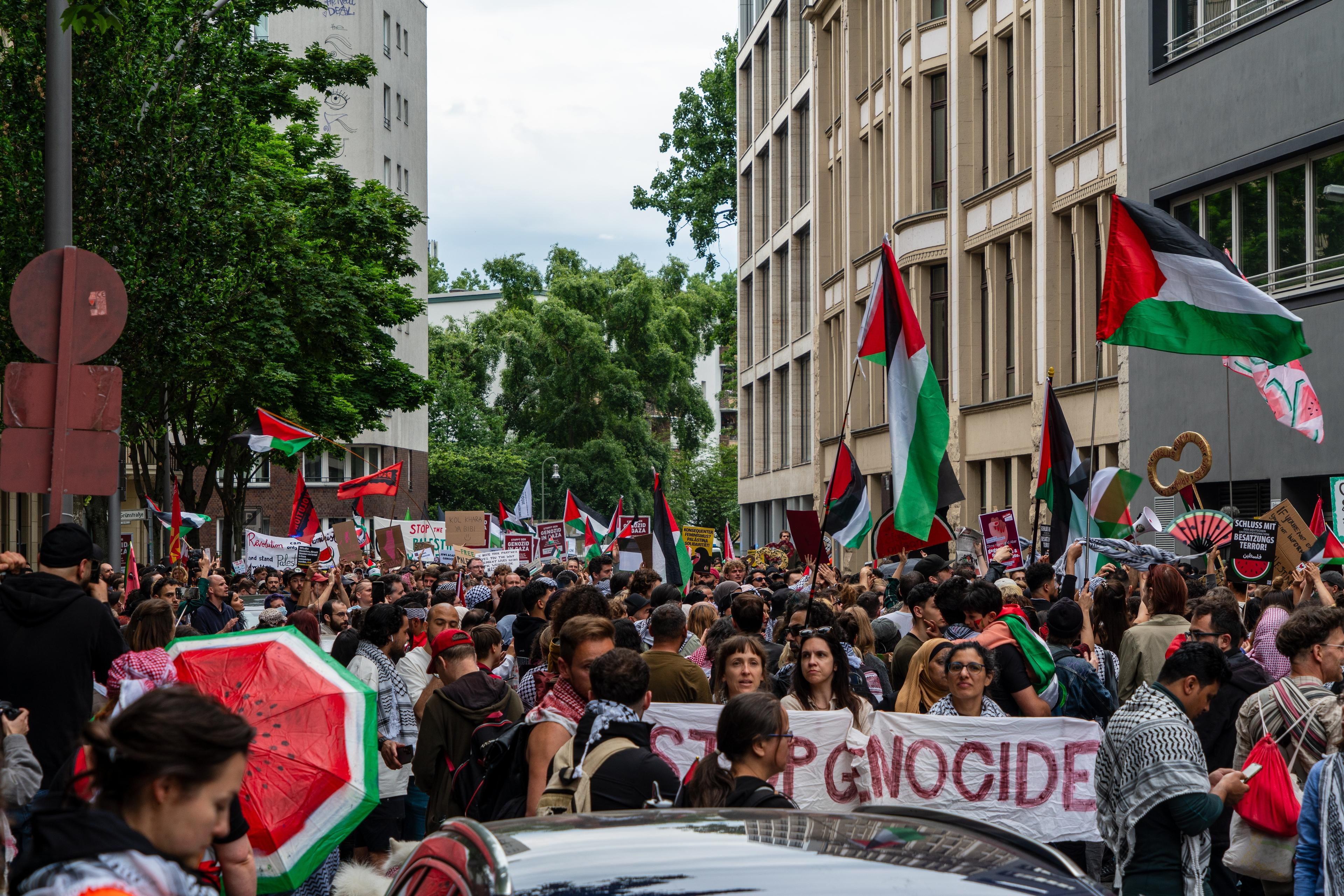From Iran to Berlin: Iman Spati's Inspiring Fight Against Antisemitism
Iranian-born activist confronts hate at Pro-Palestinian protests in Berlin
Iman Spati, a 38-year-old Iranian-born Muslim activist, has made it his mission to attend every pro-Palestinian protest in Berlin since October 7, despite facing life-threatening risks. He has participated in over 140 protests, not as a journalist, but as a concerned citizen armed with a video camera to document what he sees as Germany’s alarming descent into antisemitism and violence.

"I knew I had to be there after seeing them celebrate on October 7," Spati explains. The day marked a major escalation in the Israeli-Palestinian conflict, with Hamas launching attacks on Israel, leading to widespread celebrations among some groups. According to Ynet's report, Spati felt compelled to act, fearing the spread of hatred in Europe that he had witnessed in his home country, Iran.
Spati’s journey to activism is deeply personal. He has few memories of his father, Akbar Spati, a political activist in Iran who was executed by the regime when Iman was just two years old. The man responsible for his father’s death was Ebrahim Raisi, now the president of Iran. Before his execution, Akbar Spati recorded a message for his son: "Don’t be afraid. Wherever you go, I’ll be watching over you." In a tragic twist, Iman’s mother had to pay for the bullets used to kill her husband.
The Spati family fled Iran in 1999 as repression mounted and Iman neared the age for mandatory military service. They found refuge in Germany, where Spati soon became deeply concerned about growing anti-Israel and anti-Semitic sentiments. His activism took off after attending Berlin’s Al-Quds Day rally in 2016, where he witnessed extreme antisemitic rhetoric and saw flags of Iran, Hamas, and Hezbollah being waved. From that moment, he decided to actively document these hate-filled demonstrations.
Since October 7, Spati has attended protests in Berlin almost every week, capturing footage of the increasingly violent and hateful atmosphere. Initially, thousands came out to support the Palestinian cause, but now, as Spati notes, the crowd has dwindled to a few hundred—yet they are angrier, more violent, and increasingly antisemitic. "They attack police, throw bottles, and the officers are exhausted because politicians won’t back them up," he says.
Spati himself is regularly targeted at these protests. He is verbally attacked, followed, and threatened. In July, a protester struck him on the head with a flagpole, and later that month, he was headbutted. On another occasion, while walking his dog, he was confronted outside his home by a man wielding a knife, accompanied by a woman he recognized from past protests. When Spati gave chase, the woman falsely accused him of assault. He was briefly detained, but the assailant was soon arrested.
Despite numerous complaints about the violence at these protests, Spati is frustrated by the lack of consequences. "There are hundreds, maybe thousands, of complaints about what happens at these demonstrations, and not a single conviction," he says. He also faces harassment in his daily life, with individuals knocking on his door and accusing him of being a Mossad agent. "The rhetoric is violent and threatening, and no one is doing anything about it," Spati adds. He feels that some police officers with immigrant backgrounds see him as a problem rather than addressing the escalating violence.
The protesters at these rallies, Spati believes, form an unlikely coalition of far-left radicals and radical Islamists, united by their hatred of Israel and Jews. He argues that the mass migration of Muslims to Europe in 2015 has allowed far-left ideologies to openly express antisemitism under the guise of helping Muslim victims. The violence of October 7, he says, served as a catalyst, fanning the flames of hatred. "The far left bears responsibility for what’s happening at these protests," Spati claims. "They hate colonialist Israel and the West."
While many protesters are motivated by ideological hatred, Spati argues that a significant number are also driven by financial incentives. “Most are in it for the money,” he says. "They earn thousands of euros a month by posting protest videos that rack up hundreds of thousands of views. And it’s become ‘cool’ to be antisemitic and anti-Israel—it's a way to fit in socially."
As the protests grow more intense, Spati says that the level of violence and incitement continues to escalate. He recalls an incident when a passerby wearing a yellow badge to support the hostages in Gaza was assaulted. In another disturbing moment, a young girl was dragged into a protest march against her will. For Spati, these events have only deepened his resolve. "I’m not afraid of them," he says. "I’m afraid of what could happen. I know what it means when people try to bring the Middle East, the place they fled, into the heart of Europe."
Spati’s commitment to attending these protests comes from a deep sense of responsibility. “I don’t want to die, but I’m ready to sacrifice my life for the way of life that gave me refuge when I fled Iran,” he states. He takes comfort in the belief that his father is watching over him. "I’m certain my father is proud that his son is carrying on the fight he gave his life for."
Iman Spati’s story is one of courage and dedication to confronting hate, even at great personal risk. His unwavering commitment to standing up against antisemitism in Europe continues to inspire others to take action in the face of rising intolerance.